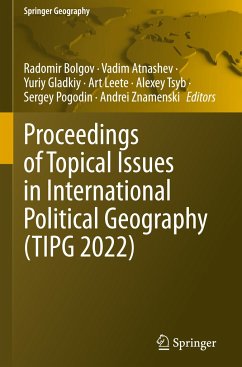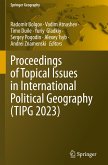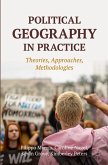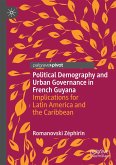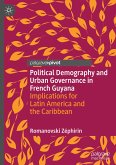Proceedings of Topical Issues in International Political Geography (TIPG 2022)
Herausgegeben:Bolgov, Radomir; Atnashev, Vadim; Gladkiy, Yury; Leete, Art; Tsyb, Alexey; Pogodin, Sergey; Znamenski, Andrei
Proceedings of Topical Issues in International Political Geography (TIPG 2022)
Herausgegeben:Bolgov, Radomir; Atnashev, Vadim; Gladkiy, Yury; Leete, Art; Tsyb, Alexey; Pogodin, Sergey; Znamenski, Andrei
- Gebundenes Buch
- Merkliste
- Auf die Merkliste
- Bewerten Bewerten
- Teilen
- Produkt teilen
- Produkterinnerung
- Produkterinnerung
This proceedings book provides selections from the 2022 Topical Issues in International Political Geography (TIPG) meeting. It addresses the main issues of contemporary political geography and international relations, providing a platform for discussion and collaboration of experts primarily in the fields of Political Geography, Geopolitics, and International Relations. Participants from all over the world consider the controversies and challenges posed by globalization, focusing, in particular, on the ideologies of globalization and regionalism, migration crises, prevention of ethnic…mehr
Andere Kunden interessierten sich auch für
![Proceedings of Topical Issues in International Political Geography (TIPG 2023) Proceedings of Topical Issues in International Political Geography (TIPG 2023)]() Proceedings of Topical Issues in International Political Geography (TIPG 2023)217,99 €
Proceedings of Topical Issues in International Political Geography (TIPG 2023)217,99 €![Key Concepts in Political Geography Key Concepts in Political Geography]() Carolyn GallaherKey Concepts in Political Geography188,99 €
Carolyn GallaherKey Concepts in Political Geography188,99 €![Political Geography in Practice Political Geography in Practice]() Political Geography in Practice35,99 €
Political Geography in Practice35,99 €![The Wiley Blackwell Companion to Political Geography The Wiley Blackwell Companion to Political Geography]() The Wiley Blackwell Companion to Political Geography78,99 €
The Wiley Blackwell Companion to Political Geography78,99 €![Political Demography and Urban Governance in French Guyana Political Demography and Urban Governance in French Guyana]() Romanovski ZéphirinPolitical Demography and Urban Governance in French Guyana39,99 €
Romanovski ZéphirinPolitical Demography and Urban Governance in French Guyana39,99 €![The Wiley Blackwell Companion to Political Geography The Wiley Blackwell Companion to Political Geography]() The Wiley Blackwell Companion to Political Geography229,99 €
The Wiley Blackwell Companion to Political Geography229,99 €![Political Demography and Urban Governance in French Guyana Political Demography and Urban Governance in French Guyana]() Romanovski ZéphirinPolitical Demography and Urban Governance in French Guyana39,99 €
Romanovski ZéphirinPolitical Demography and Urban Governance in French Guyana39,99 €-
-
-
This proceedings book provides selections from the 2022 Topical Issues in International Political Geography (TIPG) meeting. It addresses the main issues of contemporary political geography and international relations, providing a platform for discussion and collaboration of experts primarily in the fields of Political Geography, Geopolitics, and International Relations. Participants from all over the world consider the controversies and challenges posed by globalization, focusing, in particular, on the ideologies of globalization and regionalism, migration crises, prevention of ethnic conflicts, and measures to promote sustainable development. The content of the book will be interesting to experts, academics, and students in these communities.
Hinweis: Dieser Artikel kann nur an eine deutsche Lieferadresse ausgeliefert werden.
Hinweis: Dieser Artikel kann nur an eine deutsche Lieferadresse ausgeliefert werden.
Produktdetails
- Produktdetails
- Springer Geography
- Verlag: Springer / Springer Nature Switzerland / Springer, Berlin
- Artikelnr. des Verlages: 978-3-031-50406-8
- 2024
- Seitenzahl: 592
- Erscheinungstermin: 13. März 2024
- Englisch
- Abmessung: 241mm x 160mm x 36mm
- Gewicht: 1152g
- ISBN-13: 9783031504068
- ISBN-10: 3031504062
- Artikelnr.: 69418642
- Herstellerkennzeichnung Die Herstellerinformationen sind derzeit nicht verfügbar.
- Springer Geography
- Verlag: Springer / Springer Nature Switzerland / Springer, Berlin
- Artikelnr. des Verlages: 978-3-031-50406-8
- 2024
- Seitenzahl: 592
- Erscheinungstermin: 13. März 2024
- Englisch
- Abmessung: 241mm x 160mm x 36mm
- Gewicht: 1152g
- ISBN-13: 9783031504068
- ISBN-10: 3031504062
- Artikelnr.: 69418642
- Herstellerkennzeichnung Die Herstellerinformationen sind derzeit nicht verfügbar.
Radomir Bolgov. Associate professor at the School of International Relations, St. Petersburg State University, Russia. His current studies focus on the Internet public discourse and digital policies in post-Soviet countries. Program Committee member of the International Conference "Internet and Modern Society" (IMS), International Conference on Theory and Practice of Electronic Governance (ICEGOV), etc. Editor of the journal "Vestnik of Saint Petersburg University. International Relations". Vadim Atnashev. Associate Professor, School of International Relations, St. Petersburg State University, Russia. Research interests: Ethnic and Political Conflicts, International law, Human rights, Eastern countries, Countering Extremism and Terrorism. Editor of the Proceedings of International Conference "Topical Issues of International Political Geography" (Springer Geography). Yury Gladkiy. Professor, Chair of the Department of Economic Geography, Herzen State Pedagogical University of Russia. Corresponding Member for the Department of Professional Education at Russian Academy of Education. His research interests include humanitarian geography, regional economics, social ecology, and political geography. The author of school and university textbooks on humanitarian geography, regional studies, regional politics. Art Leete. Professor of Ethnology, Institute of Cultural Research, Faculty of Arts and Humanities at University of Tartu, Estonia. His research interests are hunting stories, belief narratives of the Russian Orthodox and Protestants, oral history narratives. He is an Editor-in-Chief of the Journal of Ethnology and Folkloristics. Member of expert commission of historical sacred places, National Heritage Board, Estonian Ministry of Culture. Vice Chairman of the Society of Friends of the Estonian National Museum. Member of the advisory committee for the journal "Anthropology and Archeology of Eurasia". Member of IASSA (International Arctic Social Sciences Association). Alexey Tsyb. Associate Professor of the High School of International Relations, Peter the Great St. Petersburg Polytechnic University, Russia. Editor-in-chief of the almanac "AKA¿HMEIA: materials and research on the history of Platonism". Editor of the Proceedings of Topical Issues in International Political Geography (Springer Geography). Sergey Pogodin, Professor, Chair of High School of International Relations at Peter the Great St. Petersburg Polytechnic University, Russia. He is a PC member of many international conferences and member of editorial board of academic journals on historical science, international relations and regional studies. Editor of the Proceedings of Topical Issues in International Political Geography (Springer Geography). Andrei Znamenski. Professor of the University of Memphis, USA. Fields of interest: Russia/Europe, Eurasia, Siberia, Religion, Modernity, Socialism, Nationalism. He also serves on the editorialadvisory board of such journals as "Ante Portas: Security Studies" (Poland), "Siberica", and "Alaska History".
Part 1. International Relations.- Chapter 1: The Northern Sea Route: aren't expectations too high? Chapter 2: Seek from different dream to common ground: 7.4 Joint Declaration and South-North Cooperation.- Chapter 3: Development and prospects of cooperation in the oil and gas spheres of Russia and China.- Chapter 4: An analysis of the impact of China-U.S. relations on Hong Kong's status as an International Financial Centre from the perspective of Realistic Constructivism Theory.- Chapter 5: Decision-making process in the EU foreign policy: The role of informal subprocess.- Chapter 6: Theoretical and methodological approaches to the analysis of the EU transformation process.- Chapter 7: City diplomacy within the framework of modern cross-border cooperation.- Chapter 8: Geography of Political Relations of the St. Petersburg Parliament with European Partners: Historical Experience and Prospects. Part 2. Ideologies of regionalism and globalization in historical context. Philosophy ofpolitics.- Chapter 9: Geographical neodeterminism: a broken or transformed paradigm? Chapter 10: Social development trends in the context of a turbulent world.- Chapter 11: Inclusion as a driver for the implementation of SDG-30 by the BRICS countries.- Chapter 12: Fundamental Problems of Turkic Republics in the Context of Intercultural Conflict and Nationalization Process.- Chapter 13: Western Historical Sociology, International Relations and the Studies of Russian Civilizational Politics.- Chapter 14: Information and Behavioral Diversity.- Chapter 15: Evolution of the concept "territorial sovereignty" in the digital age.- Chapter 16: Political Geographies of Spirit: Augustine and International Relations.- Chapter 17: Political Projects of Cambridge School (History of the Bensalem Kingdom).- Chapter 18: Origenism at the Cambridge School as a Political Idea.- Chapter 19: Historical and cultural space of steppe Eurasia. Concepts and images of vitality from antiquity to modernity.- Chapter 20: Russian America in the Emerging Global World of the 18th - 19th Centuries.- Chapter 21: Geography and History of Russian Foreign Trade in the 19th Century.- Chapter 22: The Term "Relocation": Meaning, Form and Function in Russian and English (Corpus-Based Research). Part 3. Administrative Culture, Political Institutions & National Policies.- Chapter 23: Tatar diaspora in North America: experience of integration.- Chapter 24:On embedding the image of the Soviet leader in the regional elite structure of the Republic of Altai (Russian Federation).- Chapter 25: The ideology of public serving in the Republic of Finland.- Chapter 26: Publication Patterns of AI policies as a Research Domain.- Chapter 27: Artificial intelligence: features of Russian digital education strategy. Part 4. Geography of Culture, Sport & Tourism.- Chapter 28: Dialogue of Russia and Europe in the Field of Musical and Theater Art in the 1730s.- Chapter 29: Cultural Relations at the Time of a Pandemic: at the Intersection of Art and Technology.- Chapter 30: Foreign cultural policy of the European Union: formation of a single cultural space.- Chapter 31: Features of the intercultural conflict: a case study.- Chapter 32: Double Degree Programmes in Global Higher Education Integration.- Chapter 33: Educational tourism as an outlook component of the marketing and operational strategy of a modern educational organization.- Chapter 34: China's Interests in the Russian Arctic Tourism. Part 5. Conflicts & Securit.- Chapter 35: National security as a concept and a notion in political discourse.- Chapter 36: The citizenship and acts of genocide against the Cham of Cambodia.- Chapter 37: Issues of modern security in Central Asia.- Chapter 38: Threats to territorial integrity as the key challenge for Turkic CIS states security.- Chapter 39: The Concept of "Global Britain" in the British Security Strategy in the Context of Post-Brexit.- Chapter 40: Global Road Safety: Fundamentals of International Cooperation.- Chapter 41: Role of European non-governmental organizations in addressing European migration crisis. Part 6. Sustainable Development.- Chapter 42: Problems of approaches to "environmental security" in the theory of international relations.- Chapter 43: Russians Attitude to Sustainable Development Strategy: System Factors of Pro-ecological Behavior.- Chapter 44: Can Fiscal Decentralization Degrade the Urbanized Environment? Chapter 45: US climate policy: features of evolution and current state.- Chapter 46: Sustainable development of active ageing policy in Europe, Russia and China. Before and during pandemic.
Part 1. International Relations.- Chapter 1: The Northern Sea Route: aren't expectations too high? Chapter 2: Seek from different dream to common ground: 7.4 Joint Declaration and South-North Cooperation.- Chapter 3: Development and prospects of cooperation in the oil and gas spheres of Russia and China.- Chapter 4: An analysis of the impact of China-U.S. relations on Hong Kong's status as an International Financial Centre from the perspective of Realistic Constructivism Theory.- Chapter 5: Decision-making process in the EU foreign policy: The role of informal subprocess.- Chapter 6: Theoretical and methodological approaches to the analysis of the EU transformation process.- Chapter 7: City diplomacy within the framework of modern cross-border cooperation.- Chapter 8: Geography of Political Relations of the St. Petersburg Parliament with European Partners: Historical Experience and Prospects. Part 2. Ideologies of regionalism and globalization in historical context. Philosophy ofpolitics.- Chapter 9: Geographical neodeterminism: a broken or transformed paradigm? Chapter 10: Social development trends in the context of a turbulent world.- Chapter 11: Inclusion as a driver for the implementation of SDG-30 by the BRICS countries.- Chapter 12: Fundamental Problems of Turkic Republics in the Context of Intercultural Conflict and Nationalization Process.- Chapter 13: Western Historical Sociology, International Relations and the Studies of Russian Civilizational Politics.- Chapter 14: Information and Behavioral Diversity.- Chapter 15: Evolution of the concept "territorial sovereignty" in the digital age.- Chapter 16: Political Geographies of Spirit: Augustine and International Relations.- Chapter 17: Political Projects of Cambridge School (History of the Bensalem Kingdom).- Chapter 18: Origenism at the Cambridge School as a Political Idea.- Chapter 19: Historical and cultural space of steppe Eurasia. Concepts and images of vitality from antiquity to modernity.- Chapter 20: Russian America in the Emerging Global World of the 18th - 19th Centuries.- Chapter 21: Geography and History of Russian Foreign Trade in the 19th Century.- Chapter 22: The Term "Relocation": Meaning, Form and Function in Russian and English (Corpus-Based Research). Part 3. Administrative Culture, Political Institutions & National Policies.- Chapter 23: Tatar diaspora in North America: experience of integration.- Chapter 24:On embedding the image of the Soviet leader in the regional elite structure of the Republic of Altai (Russian Federation).- Chapter 25: The ideology of public serving in the Republic of Finland.- Chapter 26: Publication Patterns of AI policies as a Research Domain.- Chapter 27: Artificial intelligence: features of Russian digital education strategy. Part 4. Geography of Culture, Sport & Tourism.- Chapter 28: Dialogue of Russia and Europe in the Field of Musical and Theater Art in the 1730s.- Chapter 29: Cultural Relations at the Time of a Pandemic: at the Intersection of Art and Technology.- Chapter 30: Foreign cultural policy of the European Union: formation of a single cultural space.- Chapter 31: Features of the intercultural conflict: a case study.- Chapter 32: Double Degree Programmes in Global Higher Education Integration.- Chapter 33: Educational tourism as an outlook component of the marketing and operational strategy of a modern educational organization.- Chapter 34: China's Interests in the Russian Arctic Tourism. Part 5. Conflicts & Securit.- Chapter 35: National security as a concept and a notion in political discourse.- Chapter 36: The citizenship and acts of genocide against the Cham of Cambodia.- Chapter 37: Issues of modern security in Central Asia.- Chapter 38: Threats to territorial integrity as the key challenge for Turkic CIS states security.- Chapter 39: The Concept of "Global Britain" in the British Security Strategy in the Context of Post-Brexit.- Chapter 40: Global Road Safety: Fundamentals of International Cooperation.- Chapter 41: Role of European non-governmental organizations in addressing European migration crisis. Part 6. Sustainable Development.- Chapter 42: Problems of approaches to "environmental security" in the theory of international relations.- Chapter 43: Russians Attitude to Sustainable Development Strategy: System Factors of Pro-ecological Behavior.- Chapter 44: Can Fiscal Decentralization Degrade the Urbanized Environment? Chapter 45: US climate policy: features of evolution and current state.- Chapter 46: Sustainable development of active ageing policy in Europe, Russia and China. Before and during pandemic.

